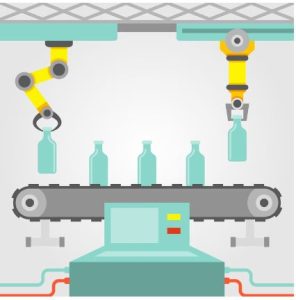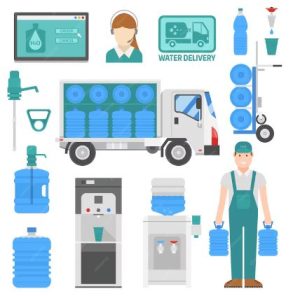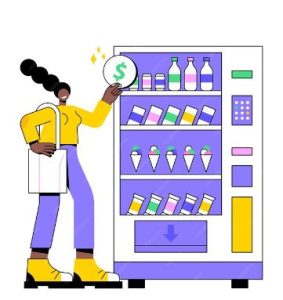Case Study 1
Automated Production Lines with Real-Time Monitoring and Quality Control (Production)
Challenges
Traditional mineral water production lines rely on manual monitoring and quality checks, leading to potential inconsistencies and human error. Mineral water companies struggle to ensure consistent product quality and optimize production efficiency.

Solution
Mineral water companies can implement automated production lines with integrated sensors and control systems. These sensors can monitor parameters like water quality, bottle filling levels, and carbonation levels throughout the production process. Real-time data is transmitted to a central platform for analysis and visualization. Automated systems can adjust filling lines, filtration systems, and carbonation processes based on sensor readings to maintain consistent product quality.

Benefits

Improved product quality with real-time monitoring and automated adjustments on the production line.

Reduced risk of production errors and product recalls due to automated quality control measures.

Increased production efficiency through automation of repetitive tasks and optimized workflow

Potential for predictive maintenance by identifying potential equipment issues based on sensor data.
Case Study 2
Smart Inventory Management and Predictive Analytics for Optimized Supply Chain (Logistics)
Challenge
Traditional inventory management relies on manual stock checks and forecasting models, leading to potential stockouts or overstocking of raw materials and finished products. Mineral water companies struggle to maintain optimal inventory levels and minimize logistical disruptions.

Solution
Mineral water companies can implement automated inventory management systems with internet-of-things (IoT) integration. Warehouses can be equipped with smart sensors that track raw materials like bottles and caps in real-time. Additionally, finished product inventories can be monitored at distribution centers and retail locations. This data is combined with historical sales trends and weather forecasts to utilize predictive analytics for optimizing production planning and ordering schedules.

Benefits

Reduced stockouts and improved product availability at retail locations through optimized inventory management.

Minimized waste and storage costs by preventing overstocking of raw materials and finished products.

Optimized delivery schedules and logistics planning based on real-time inventory data and predictive analytics.

Improved resource allocation and production planning based on anticipated demand fluctuations.
Case Study 3
Connected Vending Machines with Real-Time Stock Monitoring and Data-Driven Marketing (Sales & Marketing)
Challenge
Traditional vending machines lack real-time data on product availability and customer preferences, leading to missed sales opportunities and ineffective marketing strategies. Mineral water companies struggle to optimize product placement and marketing efforts in vending machines.

Solution
Mineral water companies can deploy connected vending machines equipped with sensors and communication modules. These sensors can track inventory levels for different water varieties and transmit real-time data to a central platform. Additionally, the machines can be integrated with digital displays for targeted advertising based on location, time of day, or weather conditions. For example, a vending machine might display an ad for cold water on a hot day.

Benefits

Increased sales by ensuring consistent product availability in vending machines through real-time stock monitoring.

Enhanced customer satisfaction by offering a wider variety of products and convenient stock refill notifications.

Improved data-driven marketing strategies by understanding customer preferences and buying habits in different locations.

Potential for revenue generation through targeted advertising campaigns within connected vending machines.
These cases highlight how mineral water companies can leverage automation technology to address challenges across their production, logistics, sales, and marketing operations. By implementing these solutions, mineral water companies can improve product quality, optimize production efficiency, minimize disruptions in the supply chain, and develop data-driven sales and marketing strategies to reach a wider audience and achieve higher sales volume.
